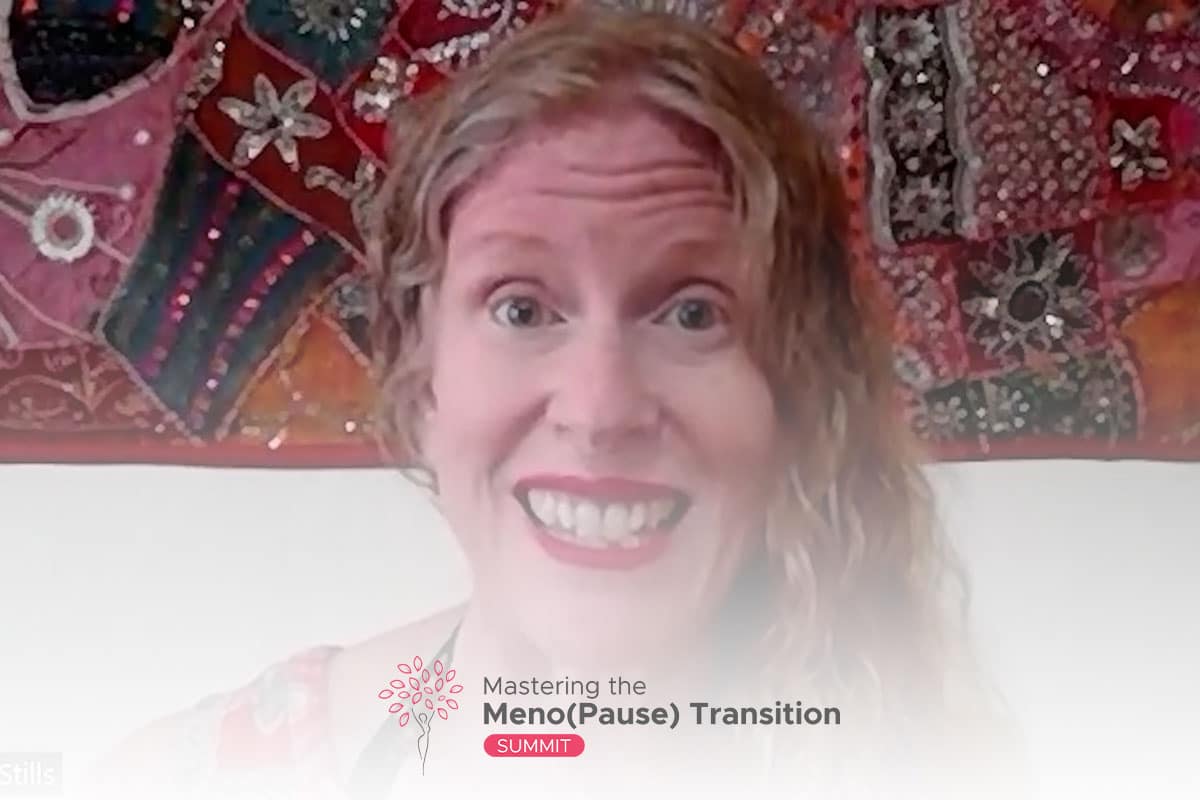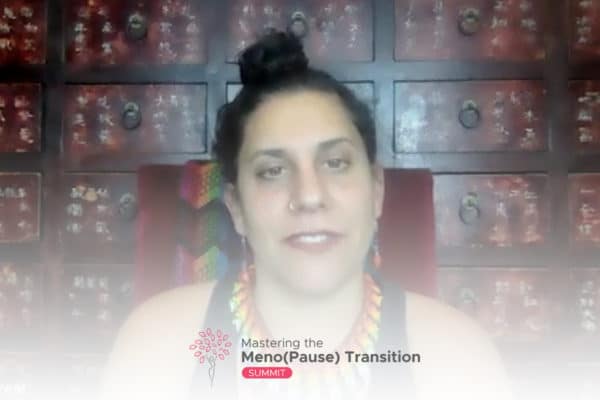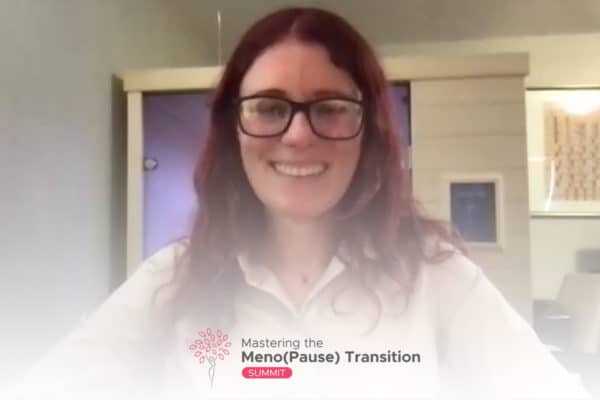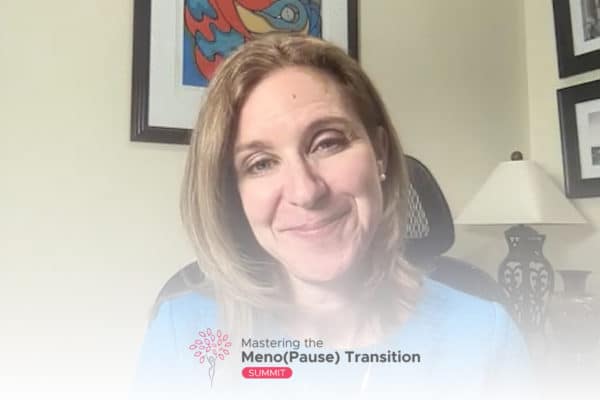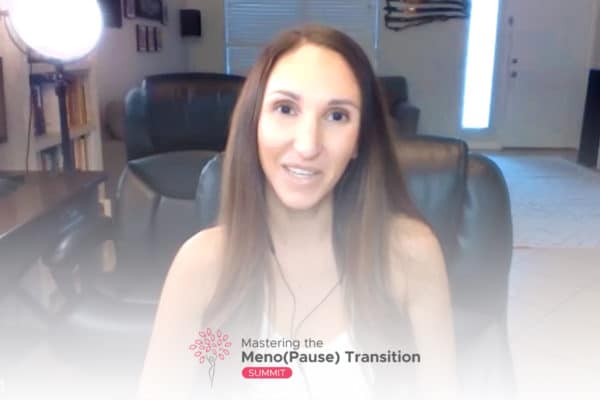So let’s start with the adrenal glands, those little nuggets that sit on top of your kidney that have so much to do with our sleep-wake cycle, with our energy, with the inflammation in our body, with our immune system. They just dictate so much… Allergies, whether you’re allergic or not. And so it’s really important. And I know a lot of us have heard, “Oh, I have belly fat, I have high cortisol.” And that is just one incy tincy bit of the story. I can tell you that so many times the women I evaluate who are dealing with belly fat, do not have high cortisol. They actually may have low cortisol. So cortisol is our stress hormone. And a lot of us have a lot of stress or have had stress, or we don’t know how to handle our stress. And so I always tell my patients, my students that we are gonna get rid of stress only when we die. So the deal is not to banish stress from your life. That happens when we die because stress is a normal part of life. The deal is to learn how to dance with stress. How to respond rather than react. And tomorrow, I’m gonna dive deep into mindfulness, which please, please, please join me because even though it’s on the sixth day, it is one of the most important pieces of how we heal. So that’s coming tomorrow.
So adrenals. And so sometimes we have been so stressed out that we have secreted all our cortisol and our body finally says, “You know what? I’m done, I’m tired, I’m not secreting cortisol anymore.” So by the time patients get to me and I check them, their adrenal, their cortisol levels are actually flatlined. And so the goal then is not to reduce cortisol to get rid of belly fat, it’s actually to bring up cortisol. And so cortisol, like so many things in our bodies, in our lives, is circadian, it has a diurnal rhythm. And it should be high in the morning and as the day goes on, it should go down. So I describe it as a ski slope. Eight o’clock, you’re up on the top of the ski on the mountain and you’re ready to go down. And as you’re going down, you’re going down. And by the end of the day, you’re at the bottom, you’re exhausted, you wanna take a hot tub, have a cup of tea and go to bed. And that’s where our cortisol levels should be at night, they should be low. And so the only way to really even see how this cortisol rhythm is happening is to do saliva testing, is to take four samples in the morning, in the afternoon, the evening, and then at midnight. So we can plot them and see do you actually have that beautiful ski slope or do you have the reverse? Are you low in the morning and get high as the day goes on? Or are you flatlined or are you totally high?
Or are you sometimes at the right place but then you drop down or you shoot up? And so it really gives me a good look to see what’s going in on your life. So usually, when I run a saliva test on a patient, I say, “Okay, don’t tell me anything and I’m gonna kind of tell you how your day goes. You get up, but you are exhausted. It takes you a while to get going. You finally get going, you crash in the afternoon. You get a second wind around eight o’clock and then you’re like, “Let’s clean the fridge, let’s scrub the floors, let’s do the laundry.” And then you have a hard time falling asleep.” And that would be someone who has low cortisol levels. And then they kind of climb up but then they crash and then they shoot up again. So I’m able to predict, it’s kind of like the cortisol levels are my magic crystal ball and I can kind of predict how your day goes. And 9.9 times outta 10, when someone does their cortisol readings, I can really tell them. And it gives us a lot of information because cortisol levels need to be addressed appropriately.
If you have too much cortisol and you give someone, let’s say glycyrrhiza, which is licorice which is a herb that extends the half life of cortisol, you’re gonna make them feel worse. And so if you have high cortisol levels at night, you might need phosphatidylserine. You might need melatonin. You definitely need some stress reduction techniques. You may need to have an orgasm, bring those levels down. So there’s lots of different ways to treat but it’s really helpful. Remember, I’m all about testing, not guessing. And so this simple saliva test can really give us a lot of information. And the reason why I’m talking about cortisol in the adrenals before I’m talking about the thyroid is because you always wanna fix or balance or address or send some TLC to the adrenal glands before you balance the thyroid. Because if you rev the thyroid and the adrenal is tired, you’re just gonna make it more tired, down goes the see saw, up goes the thyroid. And so I will never put a patient on thyroid hormone replacement, biodentical, of course, unless I’ve properly evaluated their adrenal glands.
And if their adrenal glands are in need of support, we support the adrenal glands for a minimum of four weeks before we add on the thyroids so we don’t do more harm than good. We have to remember the hormones are a symphony and they play the best music when they are all tuned up and all paid attention to. The other thing I’d like to bring up before I move on to the thyroid with the adrenal glands is that if you do have low cortisol, one of the best things I utilize is bioidentical cortisol for patients to bring their cortisol levels up. And I had a patient ask me the other day, “Does that mean my adrenals are gonna stop making cortisol because you’re giving me some?” And that was a great question to ask, but the truth is, no. If we keep it under 20 milligrams, and there’s a great book called The Safe Uses Of Cortisol by Dr. Jeffries. It’s an old book, but it’s a goodie. Reading that book has helped me changed thousands of patients’ lives and their cortisol and their adrenals and their hormones and their energy and their immune systems and all that good stuff. So if you love to read, I highly recommend checking that book out. And so when I give biodentical cortisol, and to answer that patient’s question, no.
When we support the body with some biodentical cortisol, it’s like telling your adrenal glands, “Okay, Head out to The Bahamas, head out to your favorite beach, hook up that hammock and go take a rest because we are gonna support you while you rest. So then you can come back from your vacation and you can start participating again.” And so it’s the equivalent of going on a vacation and unplugging, getting rid of the laptop, getting rid of the cell phone and really chilling out. And so that’s what bio identical cortisol can do for someone whose adrenals are really shot. And remember, the adrenals will secrete high cortisol but at some point, most people, their bodies will get tired and then that high cortisol will just drop. And so sometimes that’s where I’m seeing you. And that’s why it’s so important to test and look at your levels through cortisol… Through saliva, cortisol levels through saliva, because that is where the hormone is the most free and bio available. And that’s where we can get the best readings on it. Okay, so that’s my little public service announcement on the adrenals. And now, let’s just talk about the thyroid. And so the thyroid, oh, it’s an epidemic. It has gotten to the point where if I have a woman come in my office and her thyroid is functioning optimally, I’m kind of shocked. Because I’m so used to seeing imbalances in the thyroid. And so these imbalances can be coming from the pituitary gland in the brain.
And so it could be that the pituitary gland is not telling the thyroid what to do, that the communications are shut off. It’s the same, we didn’t talk about it about the adrenals but there’s the hypothalamic pituitary access. And so we need to make sure the brain is talking to the gland and that the gland can hear it. There can be a problem with the gland itself where there’s a lack of selenium or iodine or mercury toxicity and lack of vitamin D. There are so many issues that can throw the thyroid off. And so it’s not producing enough hormones. It can produce the T4 that it produces, but then in the periphery, where it needs to be converted into T3, which is the free and active hormone, there’s stress, there’s toxins, there’s too much hormones, too much estrogen, there’s things that are… There’s nutrient deficiencies, there’s things that are interfering with the conversion so we don’t get the free, active hormone. We can be producing reverse T3 rather than regular T3, which looks like T3, but doesn’t act like T3 and clogs the receptor sites and prevents our active hormone from making cellular changes. There is Wilson’s temperature syndrome, which is a low body temperature. Even if your blood levels look good, there’s making sure you get the right blood levels. And so I’ll just rattle them off here real quick. You want your doctor to ask for a TSH, a free T3, a free T4, a reverse T3, an anti TPO and thyroglobulin antibodies. Those are the basic six levels you wanna have run to properly evaluate your thyroid. Don’t let the doctor run a total T3 or a total T4, it needs to be a free, because free is what’s bio available and active in the body.
That’s a mistake I see all the time. And then you want someone who understands optimal levels to really be evaluating. One of the things I see often is someone will have… Free T3 is usually the range is about 2.4 to 4.2. And if someone has a 2.5 or a 2.6, they’ll be told it’s okay because they’re in range. My experience, again of working with women for over 20 years is that a lot of women need to be up at the high end or even sometimes, over the high end for them to be feeling good and feeling normal and have their thyroid symptoms reduced. And so it’s really important you work with someone who looks at you, who looks at your symptoms, who listens to you and doesn’t just look at blood work. I always first and foremost put you and your symptoms at the front of what I’m doing. And then we correlate the blood work. And if the blood work correlates, we’re like, “Yes!” You and your blood work are matched and it makes sense. But if the blood work’s a little off, just remember you are an individual. And what is optimal for you may not be optimal for who they decided the range for. So it’s really important you have someone who listens to you and works with you and guides you and helps you to make those changes especially if you are sitting there as the poster child for low thyroid function. Your hair is falling out, your thyroid… Your eyebrows are thinning especially the outer third. You can’t lose weight. Your body temperature is low. You have muscle pains. Your nails are brittle. You’re constipated. You have brain fog.
You’re fatigued, and on and on and on. And we also have to remember that those antibodies I mentioned, the anti TPO and the thyroglobulin antibodies, if those are elevated that means you have an autoimmune condition, that your body is attacking the thyroid. And so those treatments are very different than a primary hypothyroidism or an anterior pituitary that’s under functioning. These autoimmune issues need to be evaluated and treated differently. You need to look at the toxins in your body. You need to look at your diet and what your body is reacting to. So a big one is gluten, especially with Hashimoto’s. And so when you eat gluten, your body recognizes the gluten as a danger but the gluten is so molecularly similar to thyroid cells that it starts to attack your thyroid gland. And we have to remember that molecular mimicry for gluten can occur from rice and dairy and other foods. So just because you’ve got the gluten out doesn’t mean you’ve gotten everything out you need and that’s why I do specific testing so we can really see and really get the foods out of your diet that are doing harm.
Another big thing I see, I mentioned before was mercury. If you have amalgams in your mouth or you’ve had them removed or they’re removed improperly or you had them removed and you weren’t detoxed properly, that mercury can be causing an autoimmune reaction against your thyroid. You also wanna make sure your vitamin D levels are optimized. I like them between 80 and 90, especially with someone who’s dealing with an autoimmune disease process. You wanna make sure you have optimal glutathione and you’re detoxing properly. And so it’s a lot different than just taking some thyroid hormone to give yourself some extra T3. So my time is up. I tried to get a lot in there. There’s a lot more to be said but this will give you a good foundation. Even if you don’t choose to join the nine week program with me, this is a good start for you to go and talk to your physician and really start getting to the root causes of your imbalances. So I trust that this was beneficial. I am so grateful you were here and I will see you soon.

